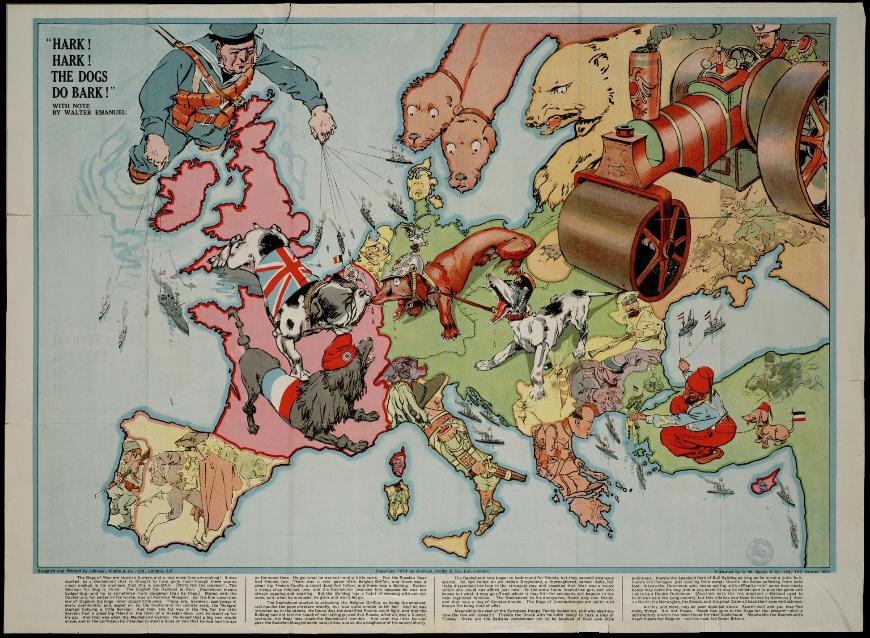
Illustrative of the aggressively belligerent mind-set of the Allies, is this British cartoon from 1914. The English and French mistakenly believed that all they need do is hold the Central Powers at bay until the Russian steamroller crushed their enemies. Not exactly pacific in nature, is it? Worse, it didn't work out that way for the Allies. {Bad Show, Old Chap}
Having established that the Austrian-Hungarian Empire had an undeniably perfect right, under international law, to declare war on the regime in Serbia, it remains only to examine the Allied interference in that war, which changed a minor regional conflict into the catastrophe that was the First World War.
On the eve of the assassination of Franz Ferdinand, the Serbian Prime Minister Pasic, lamented, "All our allies and friends of Serbia, if they knew what our officers and sergeants are doing, would not only abandon us, they would stand on the
side of Austria-Hungary and allow her to punish her restless and disloyal neighbor”. As it turned out, Pasic, needn't have worried. The Allies, in the end, did not care what the Serbians did, so long as it gave them an excuse for the war that the Allies wanted.
RUSSIA
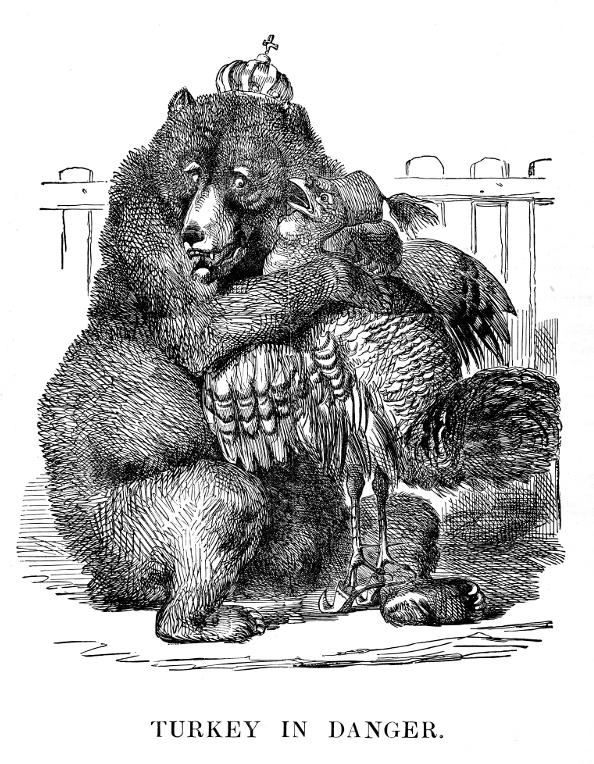
With regards to Russia, Serbia was not a noble cause, a little Slavic brother which needed to be protected at all hazard, but a sad excuse to feed Russian desire for conquest. In the decade before the war, Russia repeatedly disregarded Serbian vital interests. Just as an example, in 1908, out of the blue, the Russian foreign minister promised to support Austria-Hungary's annexation of Bosnia, to gain Austrian support for Russian access to the Mediterranean. The Serbs were hoping, at the very least, for a partition of the province, to gain ethnic Bosnian Serbs for their kingdom. But were Serbian interests and ambitions of the slightest concern to St. Petersburg? Heck, No!
Three years later, In 1911, the Russians were again bartering away Serbian interests for their own benefit. They offered the Ottoman Turks a protective alliance against Serbia and the other Balkan states, again, in return for opening the Bosporus to the Russian. The Turks turned them down, wisely, but regrettably. The sight of the Russian troops fighting Orthodox Serbs, to defend the Muslim Ottomans, would have been, in the words of the credit card company, "priceless".
What the Russians were “protecting”, when they declared war on Austria-Hungary, was their 40-year-old dream of Pan-Slavism. This philosophy, which is more aptly called Pan-Russianism, envisaged all of the Slavs in Europe living together, under a single government with one language, one religion, one Tsar, et cetera. Coincidentally, the benevolent and selfless Russians were eagerly desirous of imposing, ...er, supplying their absolute monarch, their language and their religion to their poor, deprived Slavic brethren to the west, whether these recipients desired this beneficence or not. And to get what they wanted, the Russians needed a war, and, more to the point, an excuse to start a war. Enter the Austrian-Serbian conflict.
But, as the cartoon above indicates, Russia's interests went far beyond just conquering more Slavic lands. Russia would have done anything to get access to the Mediterranean. {They still will do anything to get that access, as events in Turkey, over the next few years, will show.} You have just read about the deals Russia tried to make, at the expense of Serbia, to get that precious nautical access. And so, when the opportunity presented itself in 1914, Russia secretly mobilized its troops against Austria-Hungary, Germany and the Ottoman Empire and began offensive operations against all three countries. The telling point about the Ottoman Empire is that it didn't even border Serbia in 1914, and thus, could be no menace to the Serbs. They weren't, at that moment, even allied with Austria-Hungary. Therefore, it is extraordinarily difficult to suggest that the Serbs were the object of Russian interests, as the Tsar's ministers essentially started World War One, by attacking three nations. Serbian interests were only a means to an end.
So forget about saving Serbia. Russian self interest was, is, and always will be, the sum total of Russian interests and the only purpose of Russia's actions.
FRANCE
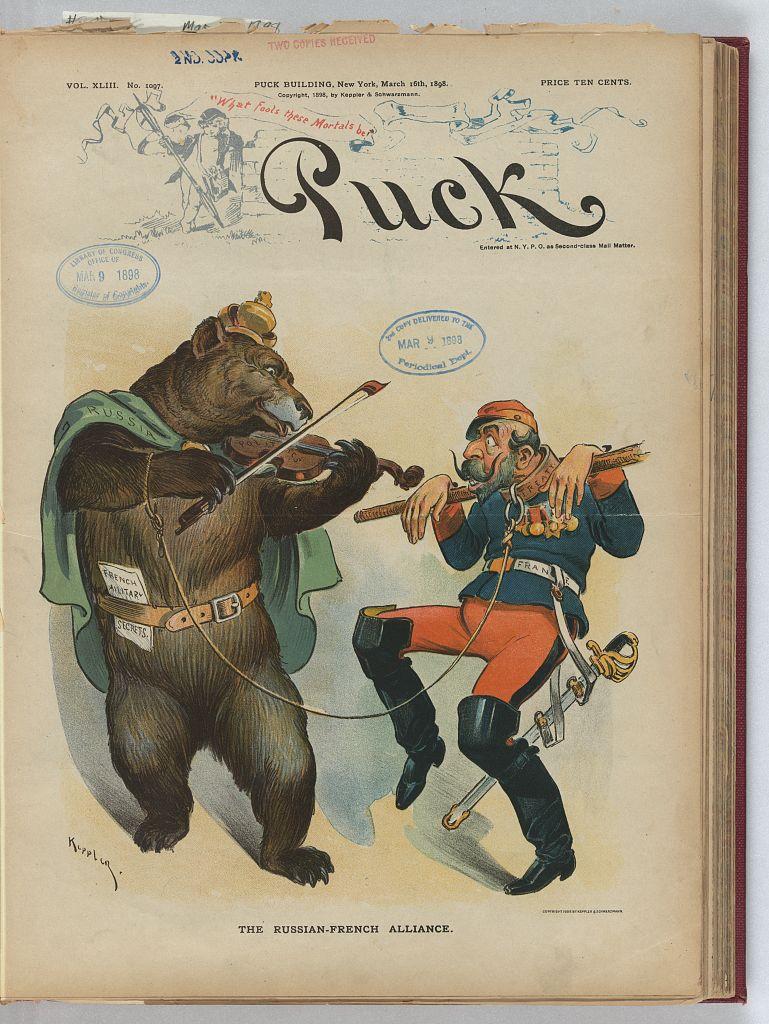
FRANCE
Going back to Austria-Hungary's annexation of Bosnia, the whole affair was a disaster for the Russians. In early 1909, Austria and Serbia were on the brink of war over the Bosnian annexation, with the Serbs expecting the Russians to support them. Desperate to hide their betrayal of Serbian interests, the Russians turned to their main ally, France, for assistance. In response, the French government, point blank, told the Tsar that Russia's vital national interests were not involved in the matter. The Russians were not amused by this rare display of Gallic common sense, and immediately set about purchasing influence in the French Government. Rubles flowed through the Champs de Elyse like so much burgundy wine. French parliament members and newspaper editors were thus "convinced" to manifest a hard-line against Vienna and Berlin. Most importantly, the election of the radical warmonger, Raymond Poincare was achieved with these Russian Rubles. Of course, Poincare did not personally need to be bought of, himself. As France's most rabid advocate of war and "Revanche" against the Germans, he seized the opportunity presented by the Austrian Serbian conflict to expand it into war with Germany, without any financial enticement.
When Russia mobilized against both Austria and Germany, in late July 1914, President Poincare knew very well that France had no obligation to mobilize in support of Russia. The 1892 Entente agreement, as parodied above, required France to aid Russia only if the Austrians or Germans initiated a general mobilization against Russia, first. In this case, the Russians clearly had mobilized first, and the French clearly knew this. As for Serbia, France had no obligation at all, treaty or otherwise.
If Poincare, under these circumstances, had referred the question of war to the French parliament, the Chamber of Deputies, he quite possibly might have lost the vote, outright. He certainly would have lost the initiative against the Germans. However, Poincare, under his own authority, circumvented the French constitution and bypassed the Chamber of Deputies, to get the war which he wanted.
Note, that the French did not send an expeditionary force to aid their little ally, the Serbs , the alleged object of their concern. {That came much later, and only to keep Serbia in the war to serve allied political and military purposes.} No, the French immediately attacked into Alsace-Lorraine, which, for them, was their only real objective in the war. It was also the only objective they envisaged when they entered the alliance with Russia in 1892. Thus, other than a plausible excuse, Serbia was of no consequence to France.
So, to save Serbia from the Austrians, France attacked Germany to retake the obviously "French" cities of Metz und Strassbourg. Certainement!
ENGLAND
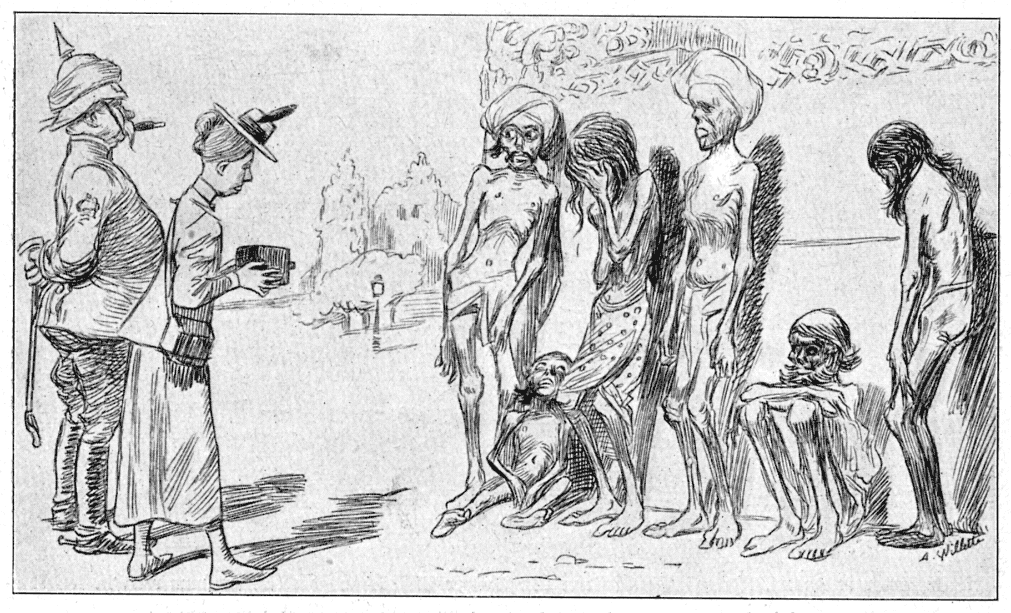
The Benevolent British Empire at its Best
The worst offender, the greatest villain, the vilest transgressor of the peace, however, was England. They were, at that time, the most powerful, and certainly, the richest nation on earth. One third of the planet was oppressively ruled in their pan-global empire. The gold and diamonds of South Africa, the rubber and oil of Burma, cotton from India and Egypt, all fed England's industries, bloated her coffers, and purchased her huge navy. If England wanted peace, there would be peace. If England wanted war, there would be war.
Don't believe me? Well, on August 1, 1914, the German ambassador to England, Prince Lichnowski, presented England's Foreign Minister, Lord Grey every possible opportunity to stay out of the war. Lichnowski offered a guarantee of Belgian neutrality in return for English neutrality, only to be rejected. {Please note, that this would be England's excuse for entering the war, later in the week}
Then Lichnowski sweetened the deal by stating that Germany would not annex any French territory, take any French colonies, or demand any reparations from France, if England would reciprocate with a pledge of neutrality. Lord Grey again rejected the offer. Finally, the German Ambassador did his William Shatner-Priceline impression and invited Lord Grey to name his own terms to secure British neutrality. Now, that is what a diplomatic "blank check" looks like! At that point, again, Grey refused to make any counter-offer, saying that he felt "obliged" to refuse to make any promises for England to remain neutral.
Facing all three allied nations in an unprovoked war, the Germans felt that they were left with no other option than the desperate gamble to try and knock France out of the war, before the allies could mount a coordinated attack on the German Empire from all sides. The necessities of geography and military science compelled Germany to attack into Belgium. This, in turn, permitted Lord Grey, Prime Minister Asquith, and their little minion, Winston Churchill, to plunge England into a world war, and kill a million British subjects in defense of Belgian neutrality, which Grey could have secured with a simple head nod.
AUSTRIA HUNGARY AND THE ALLIES
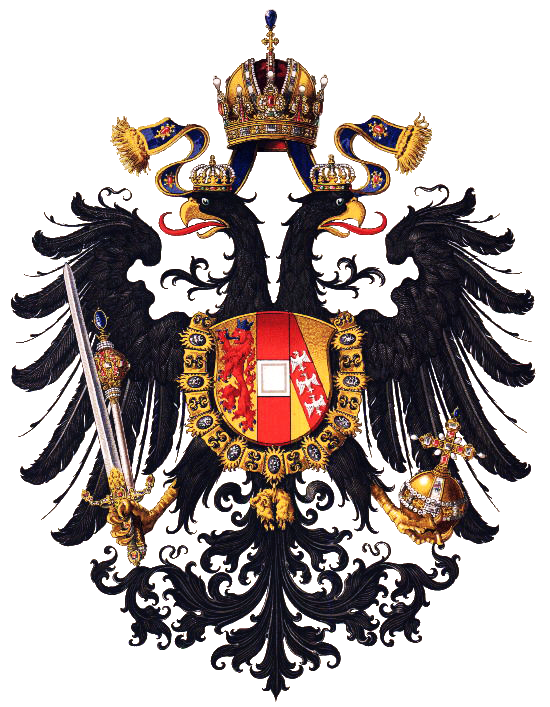
The final topic that needs to be addressed is Austria Hungary's relationship to the Allies. The day the Austrians declared war on Serbia, the foreign ministries in St. Petersburg, Paris and London had all received the solemn pledge from Vienna, that Serbia would remain an independent country, and that the Austrians would not take one square inch of Serbian territory. In 21st century parlance, Austria's war aim was simply regime change, nothing more. So the Allies can hardly be said to be saving Serbia, if Serbia was guaranteed its existence and its territorial integrity, by Austria, after the war between the Serbs and the Austrians came to an end!
Some historians have suggested that Austria never intended to keep that pledge. That is an utterly ridiculous contention. Let's not consider the great expense and internal political turmoil that the annexation of Serbia would cost Austria Hungary. If they violated this pledge, the Austrians would have committed one of Professor Oppenheim's international delinquencies. This would have given the Allies the perfect excuse to launch the world war that the pledge was intended to prevent. So you could bet your last Kronen and Heller {Austrian Hungarian equivalents to dollars and pennies) that the Austrians weren't about to annex one square inch of Serbian Territory.
Since each of the Allies had absolutely no reason to enter the war, and yet, did so anyway, all that remains to demonstrate is their "mens rea" -- their intention and knowledge of wrongdoing which manifested itself in their crime of waging an offensive war. In other words, what were the motives of the Allies in breaching the peace. Well, we have covered half of the motive, already. To recapitulate, the Russians wanted conquest: to rule, with an iron fist, every Slav from Dubrovnik to Danzig, from Bratislava to Vladivostok. Just as a tiny bonus, the Russians also wanted access to the Mediterranean. The French wanted "Revanche": revenge for their humiliating defeat in 1870 against the Prussians, in a war that, oh, by the way, the French started. They also wanted to steal back the German speaking provinces of Alsace-Lorraine, which France originally invaded and subjugated in the 1630's. Finally, England feared Germany as an industrial and colonial rival, so she wanted to destroy Germany by force, while she could, rather than peacefully compete against her rival.
The other part of the motive is simply that the Allies horribly, mistakenly, tragically miscalculated. They all firmly believed this was going to be a cakewalk, as you saw from the cartoon at the top of the page. They looked at the swift Austrian defeat by the Prussians in 1866, as being caused by fundamental political instability rather than the significant, transient technological advantage that Prussian breach loading rifles had over Austrian muzzle loaders. Further, the Allies misinterpreted the Austrian's previous refusals to resort to war in the Balkans, despite repeated provocations, as a sign of Austrian weakness. They believed their own propaganda that Austria Hungary was about to fall apart. The Allies were sure that the Austrians would fold up like a cheap zeltbahn {tent}. Austria would gone in 6-8 weeks,tops, and then the Germans would have to face the allied powers alone.
Can you say, "Oops"?
Two and one half years after the Allies started their war, the French Army was in full mutiny, and the Russian Army was disintegrating. Meanwhile, despite incompetence in their general staff and having to fight a four front war, the Austrian Hungarian Army was still in the field. Not only that, but the Austrians, with their German allies, were in Belgrade and Bucharest. Later, in 1917, they would push into Ukraine and Northern Italy. Not exactly what the Allies expected. In short, Austria Hungary outlasted Tsarist Russia, and if not for the misguided intervention of the United States, would have outlasted France and Italy, leaving England deservedly alone to face the Central Powers.
So, where is the evidence for all of this? Where is the proof? Where are the citations? They are in my paper, in the PDF document, attachedbelow. Students, particularly, will find an exhaustive supply of facts and citations, herein, to irritate their doctrinaire, obdurate, and inflexible history professors.
This concludes your trip back to the Summer of 1914. Please keep your hands and arms inside the website, until it comes to a complete stop. For one last time, I do wish to thank you for the kindness of reading my webpages, and, possibly, my paper. Please consider, once more, tweeting, liking and sharing this website.

|
Article for AH Powerpoint export.pdf Size : 552.924 Kb Type : pdf |